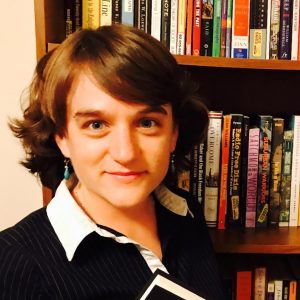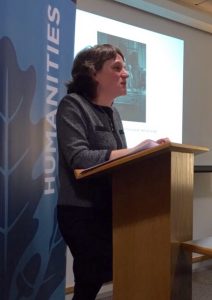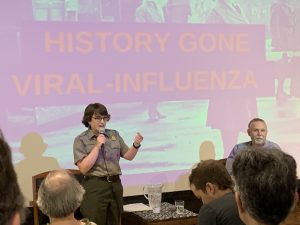In my work as a Park Ranger and in other projects I have taken on, I use the reading, writing, and research skills that I gained in this doctoral program all the time. I think like a historian and use the historian’s craft in trying to understand the world.
1) How did you decide to pursue a PhD at UConn? What was your academic focus coming into the program, and how did that evolve over the course of your studies?
 I was motivated to go to graduate school because I wanted to become a historian. Through graduate seminars, I researched a range of topics in United States history. Overall, the general themes that called to me were changing conceptions of work, race, and womanhood. I eventually wrote a new history of Home Economics in higher education (1920s-1970s) for my dissertation. This was a topic that had interested me before graduate school and one I chose to come back to after lots of tangential exploration. While reading for my comprehensive examinations, I kept wondering if I would want to change course. But this did not happen. I kept discovering that there were too many lingering questions for me to abandon Home Economics as a topic. At the start and end of my time at UConn, I saw myself working in the field of women’s history. What that means to me has changed, but the overall label still fits. I should also add that work I did outside of Storrs had a major impact on the historian I have become. I did not know about the field of public history when I entered graduate school. I had worked in museums, and particularly house museums, and knew this was part of my academic world, too. In the end, I understood that my interest in exploring “women’s work” were best suited to a career as a public historian.
I was motivated to go to graduate school because I wanted to become a historian. Through graduate seminars, I researched a range of topics in United States history. Overall, the general themes that called to me were changing conceptions of work, race, and womanhood. I eventually wrote a new history of Home Economics in higher education (1920s-1970s) for my dissertation. This was a topic that had interested me before graduate school and one I chose to come back to after lots of tangential exploration. While reading for my comprehensive examinations, I kept wondering if I would want to change course. But this did not happen. I kept discovering that there were too many lingering questions for me to abandon Home Economics as a topic. At the start and end of my time at UConn, I saw myself working in the field of women’s history. What that means to me has changed, but the overall label still fits. I should also add that work I did outside of Storrs had a major impact on the historian I have become. I did not know about the field of public history when I entered graduate school. I had worked in museums, and particularly house museums, and knew this was part of my academic world, too. In the end, I understood that my interest in exploring “women’s work” were best suited to a career as a public historian.
2) What was your experience as a graduate student in the History Department? What is your most memorable experience from the History classroom?

I entered the Ph.D. program in August 2009. This was a few months after my graduation from college and not long after the start of the “great recession.” My cohort was rather large (19) and composed of quite a few students who were going from BA to Ph.D. Being in a cohort of this size had its benefits, one being that we had a wide range of life experiences in each class. We also could choose from quite a few seminars. Within the History Department, The History of the Body with Dr. Sylvia Schafer remains a singularly important experience in my education. The instruction I received in this course prepared me to write and deliver a strong conference paper on the history of mediums. I mention this not just because it is an eccentric fact, but because this course gave me the latitude to explore something I cared about. Professor Schafer made a space for all of us to dive deeply into our work. I became a better writer because of this seminar and was exposed to new ways of thinking. I am not sure that you can ask much more of the liberal arts.
In terms of my time in front of the classroom, I had no experience with teaching prior to becoming a TA. After completing my History coursework, I decided to take courses in Education and completed my Certificate in College Teaching under Dr. Keith Barker. These classes taught me so much about being an effective communicator and leader in any environment. I use a lot of that training now even though I am not in a classroom setting.
3) What skills did you gain from the doctoral program, and how did the program help prepare you for your career?
I think of my career as more than just my job. In my work as a Park Ranger and in other projects I have taken on, I use the reading, writing, and research skills that I gained in this doctoral program all the time. I think like a historian and use the historian’s craft in trying to understand the world.

At the same time, many of the skills that I use in the workplace on a daily basis are quite different from what I was trained to do at UConn. With my current role, I work in a field called Interpretation. I have been an interpreter of some kind for nearly 15 years now. The first time that I gave a public tour, I felt as though something magical had just happened. I could not put my finger on it but I knew the work suited me. Yet I also quickly learned that I had a lot of skill building to do and much, much more to know. As I worked on my Ph.D., I did not know how to combine my love of research and deep reading with tour guiding. Working as an interpretive Park Ranger allows me to blend the best of all worlds. A big part of what I do now involves connecting people to historical and cultural resources; I also conduct outreach, write social media posts, and lead community dialogues. The truth is that I did not learn to do many of these things at UConn, though my training as a graduate student built some
of the foundation.
4) What is one piece of advice that you would give to current graduate students?
The advice I have found myself giving to others most often is very simple. Do your best to finish and remember that being a graduate student is a temporary state of being. Towards the end of my time in graduate school, I noticed that there was a kind of culture built up around being a graduate student. But being a graduate student is not a long-term identity. This type of thinking is not terribly useful to individuals, who will eventually leave. It more often serves institutions that benefit from the labor of graduate students. This is a transitional phase and not an end in and of itself.
Allison Horrocks is a public historian who works as a Park Ranger in
Lowell, Mass. She earned her Ph.D. in History at the University of
Connecticut in 2016. Allison is passionate about women’s history,
education, and public service. When not in the pursuit of a good house
tour, you can find Allison co-hosting the American Girls Podcast.
I can be reached @allisonhorrocks on Twitter.